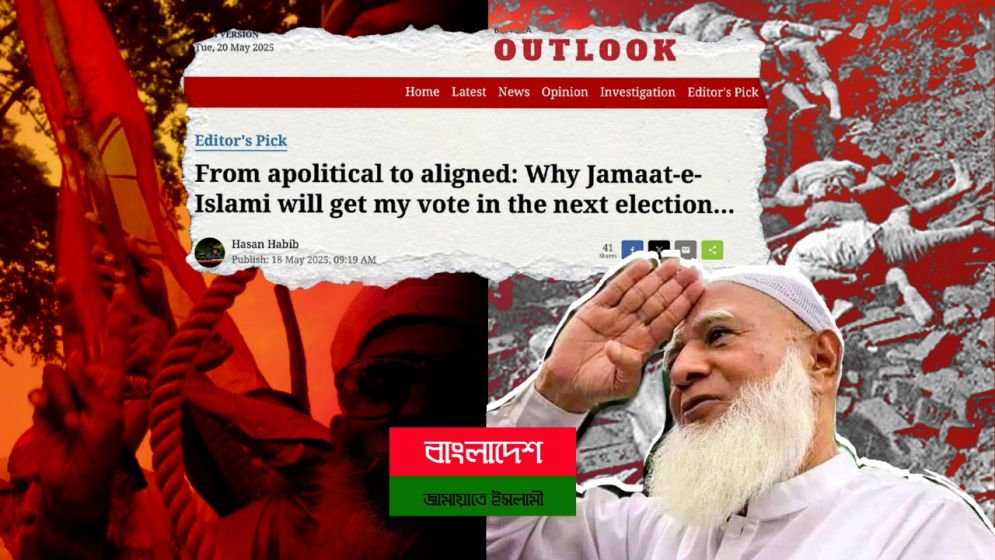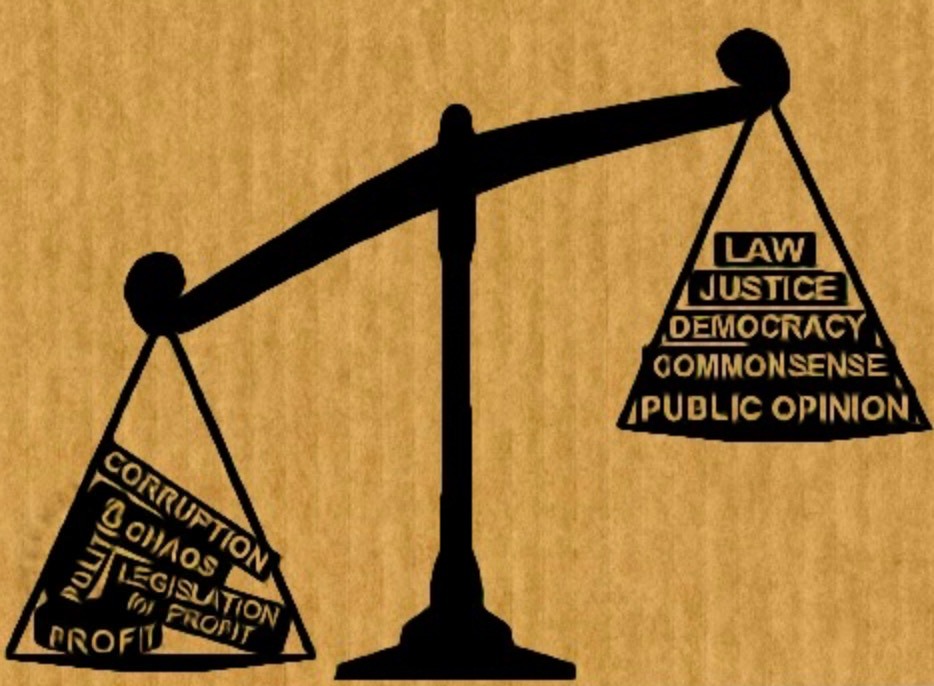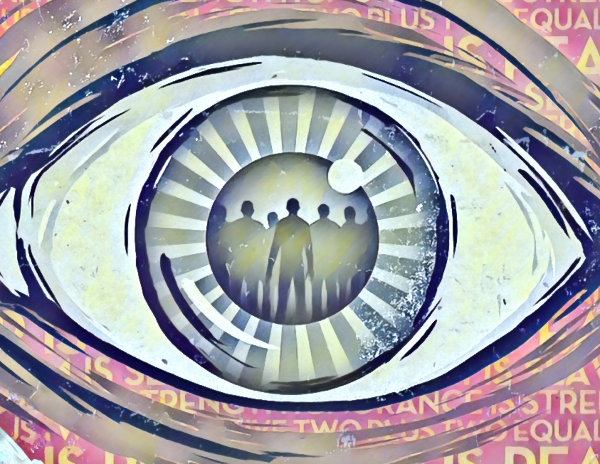I read a glossy portrait of Jamaat…but I’m not buying the narrative

A recent op-ed titled “From Apolitical to Aligned: Why Jamaat-e-Islami Will Get My Vote in the Next Election,” published in Bangla Outlook is not just misguided–it is dangerous.
It offers a sanitized rebranding of Jamaat-e-Islami, a party whose ideological core and historical legacy remain profoundly incompatible with democratic values.
To suggest that Jamaat deserves a place in Bangladesh’s political future is to erase the blood-soaked truths of its past and ignore the authoritarian instincts it still harbors today.
I write not as a distant observer, but as someone who once brushed up against the party's ecosystem during my youth. My first encounter with Bangladesh Islami Chhatra Shibir (ICS), Jamaat’s student wing, was in high school.
A few friends invited me to a mosque-based “tea circle”--a gathering framed around moral teachings and discipline. At first, it seemed harmless, even inspiring.
But that initial veneer soon gave way to something else entirely: a tightly controlled, cult-like space where conformity trumped critical thought and group loyalty eclipsed any sense of personal ethics.
I remember that I entered an essay competition on the life of the Prophet Muhammad (PBUH), organized by the local Shibir chapter. Though I didn’t win, I noticed that the winners–two Hindu students–were conspicuously chosen to showcase diversity, a choice that rang hollow against the exclusionary ideology I saw from within.
When I questioned the evaluation process, I was met with silence. That silence spoke volumes–and it marked the end of my brief, disillusioning stint in Jamaat’s shadow.
That was years ago. The tactics have evolved, but the mindset hasn’t. Transparency, pluralism, and dissent are still liabilities in Jamaat’s political theology. The author of that article Hasan Habib’s attempt to reframe the party’s 1971 war crimes as a regrettable “burden” was intellectually dishonest.
Jamaat didn’t merely oppose Bangladesh’s independence. It orchestrated violence against civilians, aligned itself with the Pakistani military, and played an integral role in death squads like Al-Badr and Al-Shams.
These are not just mere allegations. They are documented, prosecuted, and proven crimes against humanity. And while it’s true that the Awami League politicized the war crimes trials in parts, that in no way exonerates Jamaat.
What’s telling is that the party has never offered a sincere reckoning–no apology, no moral responsibility, no real remorse. That’s an unrepentant betrayal.

Changing colors of Jamaat
Bangladesh deserves a political future rooted in accountability and pluralism. Elevating Jamaat as a legitimate player in that vision desecrates it.
Jamaat’s political opportunism didn’t end with its collaboration in 1971–it simply changed form. In 1986, the party joined elections under the shadow of military dictator H.M. Ershad, participating in a process boycotted by major democratic parties.
A decade later, it struck a deal with the Awami League–only to watch its parliamentary seats nosedive, exposing the electorate’s rejection of its duplicity. By 2008, its collapse was nearly complete. The public hadn’t forgotten. Nor had it forgiven.
Even its partnership with the BNP–once framed as a strategic alliance–further unmasked Jamaat’s political parasitism. It secured ministerial posts, yes, but the cost was steep: the coalition tarnished BNP’s international reputation and left Jamaat even more dependent and ideologically compromised.
Far from expanding its democratic credentials, Jamaat consistently attached itself to the most expedient power structures available, from military dictatorships to ideologically dissonant alliances, leaving behind a trail of weakened institutions and deepened public distrust.
This is the record of an entity more invested in survival than in principles, one whose flexibility is limited only by its appetite for power.
Hasan Habib’s praise of Jamaat’s “discipline” deserves particular scrutiny. What’s described as discipline is, in truth, a culture of coercion. Jamaat’s student wing, Islami Chhatra Shibir, has long been a political militia masquerading as a student organization.
During the last BNP-Jamaat administration, Shibir exerted violent control over key universities, including Rajshahi and Chittagong. This was essentially armed dominance.
Archival reporting and public records document a chilling pattern: forced dormitory occupations, attacks on rival students, extortion rackets, and interference in recruitment processes to install loyalists. “Discipline” is the wrong word.
The myth of Jamaat’s moral rectitude is equally hollow. A troubling number of its leaders have faced serious allegations of sexual violence–allegations that don’t just implicate individuals, but point to a broader ecosystem of impunity.
In Pirojpur, a party figure was charged with the rape and captivity of a woman. In Munshiganj, a local leader was jailed on similar grounds. From Kushtia to Maheshpur to Devhata, the accusations involve minors, students, and repeated abuses of power.

The core and the shell
At its core, Jamaat’s worldview remains rigidly theocratic. Despite a prevailing wishful thinking, the party’s charter still endorses a version of governance rooted in narrow interpretations of Islamic law–an orthodoxy that excludes most Bangladeshis, whose religiosity is defined by cultural moderation, not dogma.
Pluralism, in Jamaat’s lexicon, is a PR exercise. In practice, its leaders have been accused of seizing land from Hindu temples and cremation sites, as in Satkhira–acts that reflect not just religious chauvinism, but a willingness to instrumentalize faith for control.
In a country built on a legacy of pluralism and a rejection of both religious extremism and authoritarianism, Jamaat’s ideology is antithetical to the nation’s founding ethos.
Jamaat-e-Islami likes to present itself as morally superior simply because it hasn’t been dragged through the same corruption scandals that have plagued the two major parties. But cleanliness by comparison is not the same as integrity–and Jamaat’s hands are far from clean.
Take the embezzlement of 15 crore taka from the International Islamic University in Chittagong–a scandal that implicates Jamaat-linked administrators and is still traceable in public records.
Or the misappropriation of funds intended for mosques. Or the land grabs and extortion rackets reported in Rajshahi, Cox’s Bazar, and Cumilla. These are symptoms of a culture that treats public trust as expendable.
Beneath Jamaat’s pious façade lies an economic network sustained by opaque Islamic NGOs, foreign donors with ideological agendas, and a maze of shell businesses.
While some of these enterprises perform well on paper, transparency is nowhere to be found. Financial accountability is treated as a Western intrusion–irrelevant to a movement that sees divine authority, not public oversight, as its moral compass.
And the rot doesn’t stop at finances. In Rangpur, a local Jamaat leader reportedly threatened to “eat alive” police officers for filing a case against him–a grotesque illustration of the party’s entitlement complex.
On campuses, Jamaat’s student wing, Shibir, has systematically subverted student politics to plant loyalists in public sector jobs. Merit is replaced by allegiance. Institutions built for civic development are repurposed as pipelines for ideological patronage.
Yes, Jamaat may present itself as a compact, disciplined machine–something akin to a political Singapore. But unlike Singapore, Jamaat has no independent economic engine, no institutional credibility, and no democratic legitimacy.
It survives only by attaching itself to larger, more viable political coalitions. It does not lead movements–it clings to them.
If Bangladesh is to navigate a post-Hasina future, it needs a political rebirth rooted in accountability, civic freedom, and genuine reform–not ideological nostalgia dressed in clerical robes.
Jamaat’s long record–defined by violence, misogyny, sectarianism, and strategic failure–disqualifies it from leading any serious democratic transition.
—
The writer is Australia based data professional, urban planner and a political thinker

